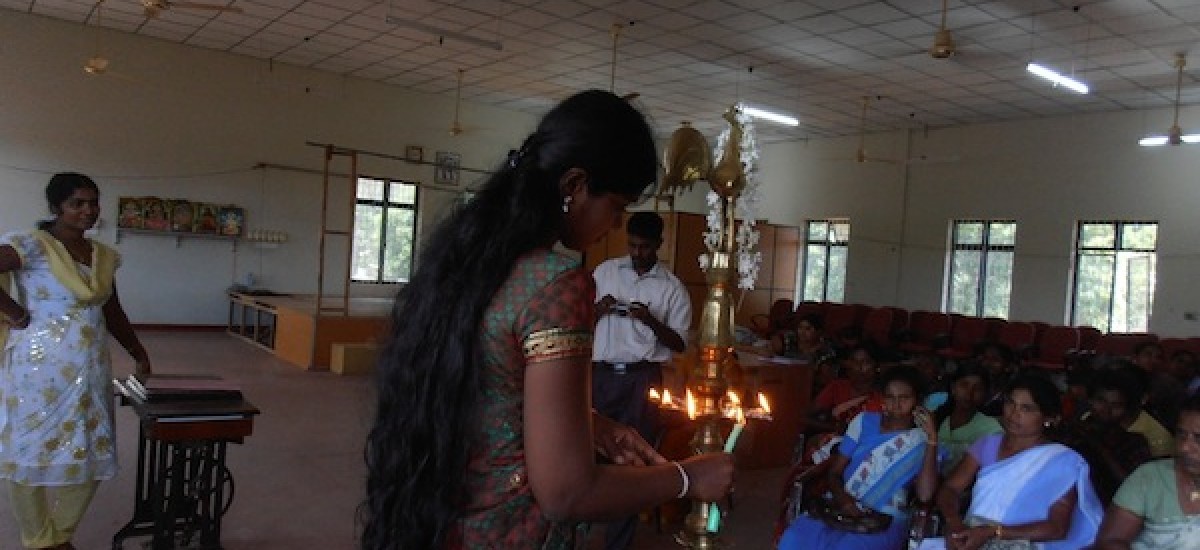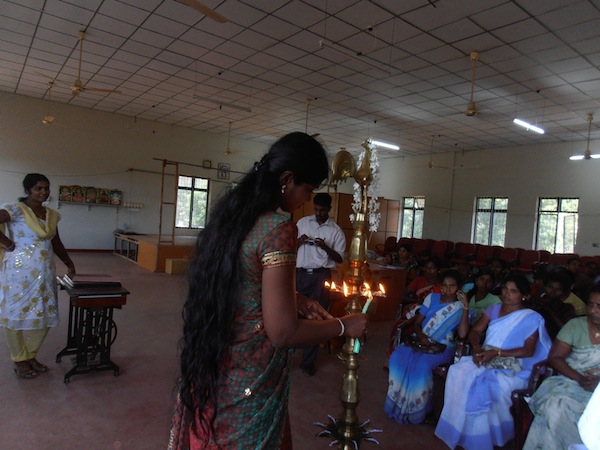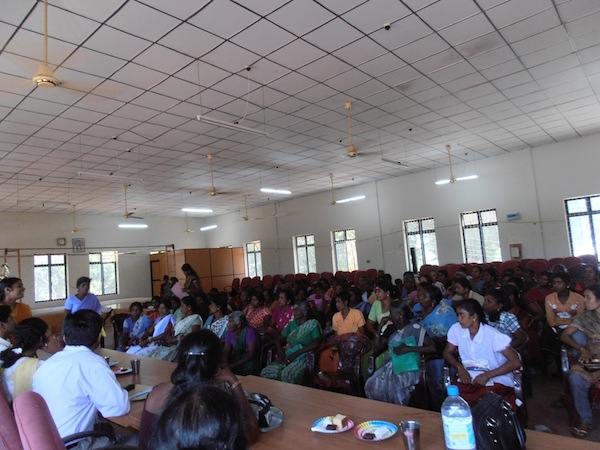A group of war widows in the Nedunkerny region of the Wanni District celebrated the International Widows’ Day on 22nd June, 2012 at the conference hall of the Nedunkerny Pradesa Sabai. This meeting was organized by an NGO in collaboration with the relevant officers of the Divisional Secretary of Nedunkerny who had arranged for the distribution some material for income generation activities provided by NGOs. The funds for this meeting was provided by an UK based charity organization working for war affected children and widows. This meeting was attended by representatives of these organizations and more than a hundred war widows who had been invited to commemorate this day and listen to motivating speeches by experienced persons to give hope for these widows who had been rendered destitute by the recently concluded war. Some of these widows made use of this opportunity to cry out the problems they are facing consequent to their re-settlement in this region.
Nedunkerny is situated midway on the road from Vavuniya to Mullaitivu and has suffered devastating consequences during the war. Agriculture has been the prime occupation of the people who resided there prior to the escalation of the war. Most of the residents of Nedunkerny had fled to other parts of the region when the fighting became intense. According to the figures available at the Divisional Secretary’s Office, with the conclusion of the war 4000 families have returned to the region, many of whom had been re-settled. A majority of them are women who had lost their husbands and some of their children. Some of them have lost one or more of their limbs. Most of them have even lost some of their family members. There are 587 war widows among them, living within the 20 Grama Niladharis Divisions in the area. During the interaction by the relevant officials with these widows, collaborative evidence was found on a number of problems these widows are encountering since they returned to Nedunkerny.
Some of these problems are set out below:
- Most of these widow are living in improvised houses which do not provide adequate security for the inmates.
- Many of these widows are vulnerable for sexual abuse by undesirable persons in the region.
- A large number of children of school going age, do not attend school. Some of them are often sexually abused .
- Poverty has driven some women in this area to earn a living by indulging in prostitution.
- Brewing illicit liquor has become a cottage industry in some parts of Nedunkerny.
- Most of the young men and women in this division do not have any avenues for employment or even though some have received vocational training.
- Traditionally they had been marketing their produce in Vavuniya and Mullaitivu. They have no easy access to these markets now.
- Many people do not have any legal documents, either to prove who they are, when they were born, to whom they are married or which lands belong to them.
- Their inability to meet as a group to discuss their problems has inhibited the germination of leaders from among them.
- Some of the widows being disabled and many of them living far away from each other’s residence, has made it difficult for effective communication among the widows who do not have convenient means of travel within the villages.
The widows of Nedunkerny are only a sample of the 89,000 war widows spread out in the North and the East of the country. The problems identified could be more or less the same in most of the regions in these provinces.
It was pointed out in my message read out at this meeting that according to a survey there are 245 million widows worldwide of whom 100 million are in dire circumstances. The UN Declaration of International Widows’ Day was the result of an initiative taken at the UN General Assembly in 2010 by the Loomba Foundation based in U.K. It is a recognized international organization caring for widows around the world. I believe the Widows’ Day Celebrations in Nedunkerny on 22nd June is the first occasion that such a day was celebrated in Sri Lanka.
The audience was reminded that this meeting should not be confined to just making speeches and going back to their usual lives thereafter, but should signal the beginning of a process that would eventually lead to making all the widows get over their dire circumstances and transform themselves into women who could meet their own needs from their own incomes. Those who receive assistance for income generation activities today should make every effort to get the maximum benefit out of their activities. The widows have to remember that they are not a forgotten lot. There are many who are very much concerned of their well being. What they should do to make their voice heard and get recognition of their problems is to form themselves into small groups or join the organizations that are working for them. They need to realize that if they raise their voice on their grievances jointly they would be heard by those at a greater distance than by single voices crying out in the wilderness. When their voice is loud enough even the State will find it difficult to ignore them.
Almost all widows are persons with some skill or the other. They possess hidden and untapped abilities. It should be the work of social service organizations and the State to identify their abilities, provide the basic amenities and avenues needed to enable these widows to make use of their abilities to alleviate their lives. They need to be transformed from the category of persons who are always waiting for someone to provide their needs, to persons who can provide for themselves and for their communities using their own skills.
Let us hope when the International Widows’ Day celebrations are held next year, there will be fewer widows at least in Nedunkerny, who would need assistance from the State or from other organizations and they would come forward to commemorate this occasion with their own resources on their own volition.



